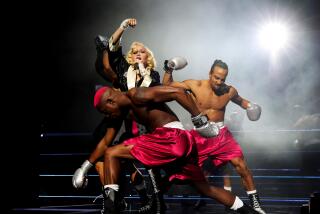Disabilities: The Problem With Parties for the Wheelchair-Bound
- Share via
Thoughts on Linda Feldman’s “Wheelchair Hostess Says: ‘Let the Good Times Roll!’ ” (Sept. 25).
Your article about Sue’s Socialites irked me to no end. I am a severely physically disabled person who uses a power wheelchair. “Severely” is the census’ definition for people like me who cannot do a central function, walking in my case. In the past I have attended Ms. Gordon’s gatherings for the disabled.
Let me make it clear I hold no animosity for Ms. Gordon. But I do hold a great deal of animosity for what she is doing. I am equally, if not more, disturbed by the point of view of this story and so many others.
Why?
First, Ms. Gordon is running an essentially segregated activity where disabled people get together to socialize with disabled people and eat surplus food. When she says that she is answering a need, I understand. But it is not this kind of party--more ghettoization--that solves the problem of segregation and stigmatization of people with disabilities. Such occasional parties are merely proof of the problem and perpetuation of it.
Again, this is not Ms. Gordon’s fault. You get to see the context in which she, according to the story an able-bodied person until 30, was raised. Her dad described Ms. Gordon’s party-goers. “These are Sue’s kids,” he says, “and we’re the mama and papa.” Even a cursory view of the attendees in the accompanying picture will tell you that they are not kids. Just as the Jerry Lewis Telethon and “Jerry’s Kids” offend such a high percentage of disabled people, this activity, and your rhapsodizing over it, has a core of paternalism, infantilizing the disabled.
The idea of leftover food from Canters for leftover people is from another era, not one in which disabled people are supposed to be equalized by their 4-year-old Americans With Disabilities Act. It conjures up a society unwilling to welcome the former lepers of the socioeconomic structure into their homes, relationships and parties--no matter what the law says.
“Let the Good Times Roll!” says the headline. Another former attendee reminds me that Sue has never allowed alcohol at her parties. Nothing like keeping the lepers sober and more moral than everyone else! These are parties only a missionary or an administrator of an institution could think of as merry affairs, where some of the enormous tensions and inhibitions created by the daily battle with a super-physicalist Southern California culture can be loosened.
Again, I am sure something is better than nothing for some disabled people. Yet to romanticize and heroize such an essentially depressing undertaking, as so often is done by a press nearly completely devoid of severely disabled regular staff, merely shows where the press is rather than where we ought to be going.
I, like other visibly disabled people, would enjoy being invited to parties--something that nearly never happens. But not any party, and not parties where the only thing that we have in common is a wheelchair and the fact that we had to pay an admission charge.
In a way such parties are a parody of parity--a charity where people give away worthless things to useless people--and exactly what is wished for by many able-bodied people.
“I’m not the type to ask for help,” says Ms. Gordon, a theme that obviously pleases the editors, since it is placed in bold letters at the top of the story, even though, in the text below, Ms. Gordon says, “I don’t have the funds, so I have to get donations.” When a writer such as Linda Feldman is out to conjure up the stereotype of a brave cripple going it alone (and most important, not asking anyone to part with anything of value), the facts should never be allowed to get in the way.
BILL BOLT
Writer and disabled activist
Culver City


